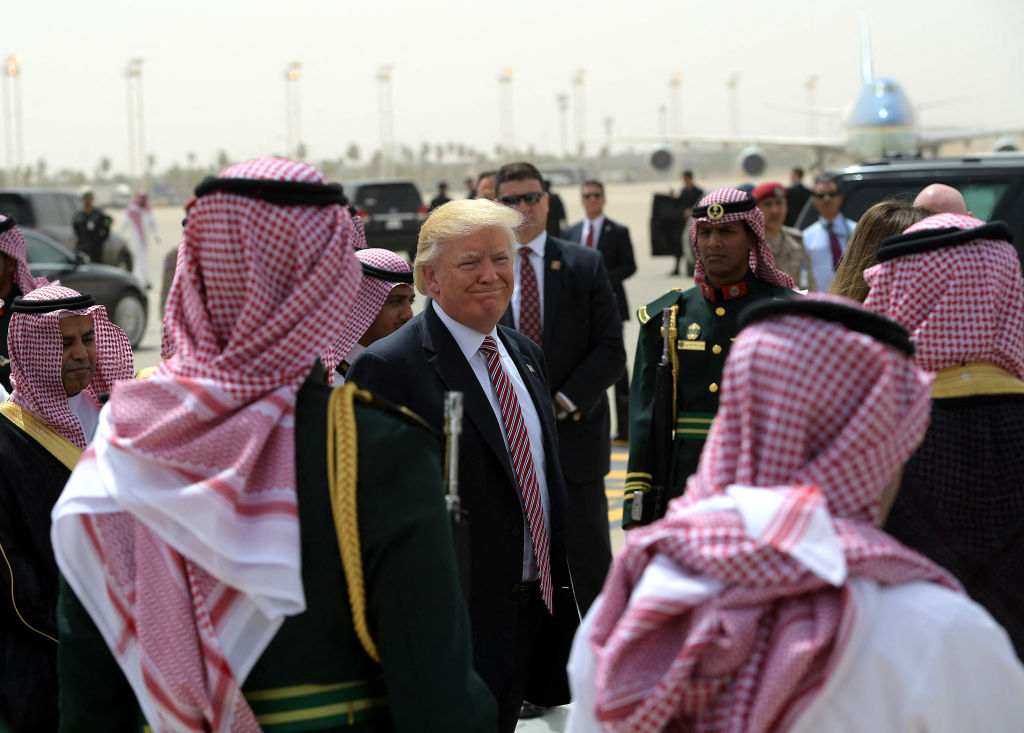How our nation can once more be a beacon of freedom.
Getting Peace in the Middle East

Trump’s approach to peacemaking has its origins in the Reagan era.
There is a striking similarity between the situation President Reagan faced in 1982 and the state of the Middle East today. There are three valuable lessons from the Reagan era that will almost certainly help inform the future course of President Trump’s approach toward peace: 1) the countries of the region want security above all, and the United States is the only one that can provide it; 2) Saudi leadership is essential for any comprehensive and durable peace; and 3) laying the foundation for relationships between Arabs and Israelis can only take place in private, far from the public view. Liberal institutions and commentators might question the new administration’s ability to make further gains on regional peace absent a comprehensive solution for the Palestinian issue, but their skepticism is more a consequence of their narrow vision for how negotiations should be run.
President Reagan’s peace plan has often been given short shrift. It was put forward in September 1982 after Yassir Arafat’s withdrawal from Beirut and before the assassination of President-elect Bachir Gemayel. The Israeli military had inflicted enormous damage on Lebanon. A radical Palestinian camp had been badly bruised and temporarily pushed to the margins, and there was hope that a new regional order might emerge. But the timing was wrong: Iran had only just begun to intervene directly in the conflict, the regional fighting had become intimately linked to Syria’s own domestic stability, and Israel was about to enter a period of political division and soul-searching.
Then, as now, we can understand and appreciate Washington’s desire to propose a constructive way forward at a time when the Middle East appeared to be at a crossroads. Critics of Reagan claimed from the outset that the administration’s efforts were naïve and ill-informed, overlooking the hard realities of the region in pursuit of a vague geopolitical strategy. By the same token, critics of the first Trump Administration’s Peace to Prosperity plan took it to task for “presidential arrogance” and a lack of “commitment to serious peacemaking.” However, as with both Reagan and Trump, it is possible to seek peace through strength without having to go to such lengths as democracy promotion and military invasion.
The most notable parallel with today is that Reagan felt he could find a partner in Saudi Arabia. Crown Prince Fahd, seeking to craft a more dynamic foreign policy in the waning days of the rule of his elderly brother King Khalid, proposed his own plan for regional peace on August 7, 1981. It was eventually taken up in modified form by the Arab League at the summit in Morocco in September 1982 and communicated to the United Nations. That proposal carried the implicit promise that if the Americans could deliver the Israelis to the negotiating table, the Saudis would do the same for the Palestinians, even if that meant a heavy lift in terms of managing Arab expectations.
It was the beginning of a tradition that would underpin Saudi King Abdullah’s support for the Arab Peace Initiative in the 2000s, and echo in the recent launch of the Global Alliance for the Implementation of the Two-State Solution. Whether or not the Israelis and Palestinians can ultimately come to terms and finalize an agreement is a question that only those two parties can answer. But Riyadh will encourage the Arabs to support negotiations as long as Washington can do the same with the Israelis, even as other more tangible and achievable forms of economic and security cooperation take place elsewhere. In the spring of 1982, that meant Fahd sending out his personal envoy, Bandar bin Sultan, to negotiate Palestinian withdrawal and government formation in Lebanon, thereby allowing the Saudis to develop a back channel with the Israelis.
It is misleading to think that the only path to peace in the region is through the kind of shuttle diplomacy that produced the Oslo Accords and the peace treaties with Egypt and Jordan. Those efforts by the Carter and Clinton Administrations were certainly achievements in their own right. They produced formal treaties that politicians on all sides could use as tangible reminders of their importance and relevance on the world stage. They accrued benefits for governments in terms of foreign assistance and political support from Washington, and jobs and attention for a cottage industry of academics, think tank experts, former diplomats, and civil society leaders.
An alternative approach of peace through strength is just as valid. As Secretaries Shultz and Haig said in their testimonies before Congress in October 1981, U.S. arms sales and security cooperation with Saudi Arabia enhanced American influence. In doing so, they helped ensure the continuation of Saudi Arabia’s leadership in charting a path for the moderate Arab states in the region, which has paid dividends in preserving Israel’s security. It is no different than President Trump’s proposed sale of F-35 aircraft to the UAE or recognition of Morocco’s sovereignty over Western Sahara.
These were all separate actions to improve regional defense and security. But when viewed within the framework of a broader conversation on regional peace, they could be seen as overlapping and interlocking efforts that would contribute to a shared sense of confidence and trust between Israel and the Arab states. That approach, in many ways, is more important than a unitary and linear process of negotiations leading to a treaty.
If peace was merely a process of security guarantees and a Palestinian homeland, normalization with Israel would be a mathematical formula. In line with that conception of peace, pundits and journalists have spent the last four years speculating on what type of incentive structure might accommodate Saudi needs, and whether Brett McGurk’s attempts to fine-tune the details of prospective defense and nuclear agreements are appropriate for American interests. This, too, has been profoundly misunderstood. If policymakers in Riyadh know that Washington expects a transactional negotiation, then Riyadh will naturally oblige. But for American officials to then assume that they have listened carefully and appreciated Saudi concerns would be misguided.
What Saudi Arabia wants and what it needs are two different things. The Kingdom may desire all sorts of cooperation on science and technology, and it may present those desires when requested by American officials, but such things need not be prerequisites for peacemaking. Military hardware and partnerships on artificial intelligence, genomics, and other fields will inevitably proceed apace over time, just as they have for the Emiratis and others. What Riyadh fundamentally needs is something much broader and more significant than any single deliverable—recognition by the United States of its pivotal role that is accompanied by treatment on an equal footing in setting the agenda for the region. Only the United States can provide that, and it is the one thing the Biden Administration could never seem to accomplish.
None of this is to say that Israeli-Palestinian negotiations are avoidable or undesirable. There is a place for negotiations on the future of the Palestinians, as Reagan and Fahd understood with their plans and just as Trump built into the Peace for Prosperity initiative. But it should only be one strategy among many, without holding other tangible forms of cooperation hostage to progress on that front. It is an approach that does not accord with the many histories of Middle East peace written by former staffers in Democratic administrations and their students. And it comes with an entirely different set of assumptions about how to partner with the Arab states and what kinds of outcomes can be achieved. Yet it is a legitimate approach to peacemaking, one that has a solid conservative lineage reaching back to the Reagan era and a proven track record of success in the Abraham Accords.
The American Mind presents a range of perspectives. Views are writers’ own and do not necessarily represent those of The Claremont Institute.
The American Mind is a publication of the Claremont Institute, a non-profit 501(c)(3) organization, dedicated to restoring the principles of the American Founding to their rightful, preeminent authority in our national life. Interested in supporting our work? Gifts to the Claremont Institute are tax-deductible.
Is California turning on its Jews?
The increasing likelihood of an attack in the U.S. should make us consider how we will answer.
The U.S. should double down on its support of Israel.
Progressive opposition to Israel’s military operation is rooted in racism and antisemitism.
Kiev is desperate for the West to come to its rescue.






